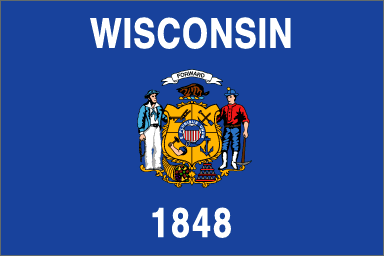Wisconsin Gambling Laws

Is Online Poker / Gambling Legal in Wisconsin?
Wisconsin has a number of proud, unconquered Native American tribes in the state, so you'll find a couple of dozen Indian casinos inside Wisconsin's boundaries. All gambling regulation is handled by the State of Wisconsin Department of Administration's Division of Gaming, along with the Wisconsin State Lottery Commission.
Wisconsin Poker Law
How does Wisconsin law apply to games of poker played with real-money stakes? The answer depends on how and where you play said poker. We'll get to those details in a minute, but let's begin by briefly returning to how Wisconsin defines gambling and whether or not that definition covers poker.
Wisconsin has a fairly clear definition of what defines a gambling act. To make a "bet" per Wisconsin law (defined in Section 945) is to risk something of "value" on an event or outcome that is "dependent on chance."
"Dependent" is a more lenient standard for defining than you'll find in some other states. For example, Nebraska only requires an "element" of chance. And poker players may one day convince a Wisconsin court that the definition of gambling does not apply to poker. But the practical truth subscribed to by the casino industry and law enforcement in Wisconsin is that poker qualifies as gambling.
Let's talk a bit more about that casino industry, as it offers the main outlet for legal real-money poker in Wisconsin. There are a number of tribal gambling facilities in Wisconsin that offer live poker rooms; the largest is generally regarded to be the poker room at the Potawatomi Bingo Casino. The Ho-Chunk in Madison and the Oneida in Green Bay also provide active live poker rooms for players.
What about charitable gambling? Authorized in Wisconsin under Sections 563.02-563.98, charitable gambling is exempt from Wisconsin anti-gambling law. However, poker did not make the cut (nor did "Vegas nights" that often include poker tournaments) - charitable gambling only covers games of bingo and select types of raffling activity.
We'll wrap up with social gambling. Another bit of bad news for poker players here, as home poker games played with money do appear to exist in violation of the law in Wisconsin. Home games generally rely on what's called a social gambling exception to state gambling laws, but Wisconsin has never amended their law to adopt such an exception.
Native American Tribes and Wisconsin Casinos
Class III gaming (Indian casino gambling) is regulated by gaming compacts framed in common agreement by the Tribes of Wisconsin and the State of Wisconsin. Because the 19th century treaties between the Native American tribes and the United States Federal Government are seen by the U.S. Supreme Court as treaties between nations--not agreements between a sovereign and mere citizens--the Indian reservations are seen as sovereign territory belonging to the Indian Nation living there.
Under this interpretation of the old Native American treaties, Indian tribes have every right to decide whether they want gambling on their reservations or not. The Supreme Court stipulates that Native American tribes can build casinos, though they must come to a gaming compact with the U.S. state inside which the reservation is found. Throughout the United States, this has created a legal gray area where gambling casinos can be built in states where moralistic politicians and lawmakers would like to outlaw gambling. Wisconsin, itself named for a Native American tribe, is home to several distinct Indian nations.
The Native American casinos have had a major impact on Wisconsin gambling, but let's start by going back to the era before the Indian casinos appeared.
Are Greyhound Race Tracks Legal in Wisconsin?
After passage of a 1987 act, Wisconsin gambling laws allowed for dog track racing and parimutuel gambling on these dog races according to Wisconsin law Chapter 562.02, but the final greyhound racetrack closed in 2009. If a track were to open or reopen, the Wisconsin Division of Gaming, under the auspices of the Wisconsin Department of Justice, would continue to have oversight powers. This is unlikely to happen, since the state had 5 race tracks as late as the early 1990s. When the Dairyland Greyhound Park closed on December 31, 2009, this marked the end of the dog track era in Wisconsin. Like its former competitors, Dairyland cited loss of revenues due to competition from local casinos.
Learn About Other State Laws
Wisconsin's Native American Casinos
The Ho-Chunk, Oneida, St. Croix, and Potawatomi tribes each own two or more casinos in the state of Wisconsin. The Ho-Chunk Nation has six different casinos in Wisconsin, in the cities of Madison, Tomah, Barbaroo, Wittenburg, Nekoosa, and Black River Falls. The St. Croix Nation has 3 different casinos in the state, including facilities in Danbury, Webster, and Turtle Lake. The Oneida Nation owns five Wisconsin casinos, all of which are found in Green Bay. The Potawatomi Nation has a casino located in Milwaukee and a casino found in Carter.
Besides those locations, other Indian casinos can be found in Bayfield, Bowler, Hayward, Odanah, Oneida, Crandon, Keshena, Green Bay (2), and Lac Du Flambeau. You could say that Wisconsin is a pro-gambling state, though the legislature certainly had to recognize the many Native tribes in their state and the reality some of these tribes would eventually have their own casino properties.
Wisconsin State Lottery
The Wisconsin Lottery Commission runs the Wisconsin State Lottery on behalf of the government. This lottery offers games like Megabucks, Supercash!, Pick 3, Pick 4, Badger 5, and Super 2nd Chance. Seasonal raffle promotions like the May Raffle and other short-term games like the Supreme Crossword Drawing are held occasionally. The Wisconsin Lottery also allows games like scratch tickets and pulltab tickets. Finally, Wisconsin is part of the multistate lotteries, so lottery gamblers can buy Powerball tickets and Mega Millions tickets at local vendors. In other words, Wisconsin embraces the lottery and its citizens can enjoy most forms of lotto gambling.
See also:
- http://www.doa.state.wi.us/
- http://www.wilottery.com/
